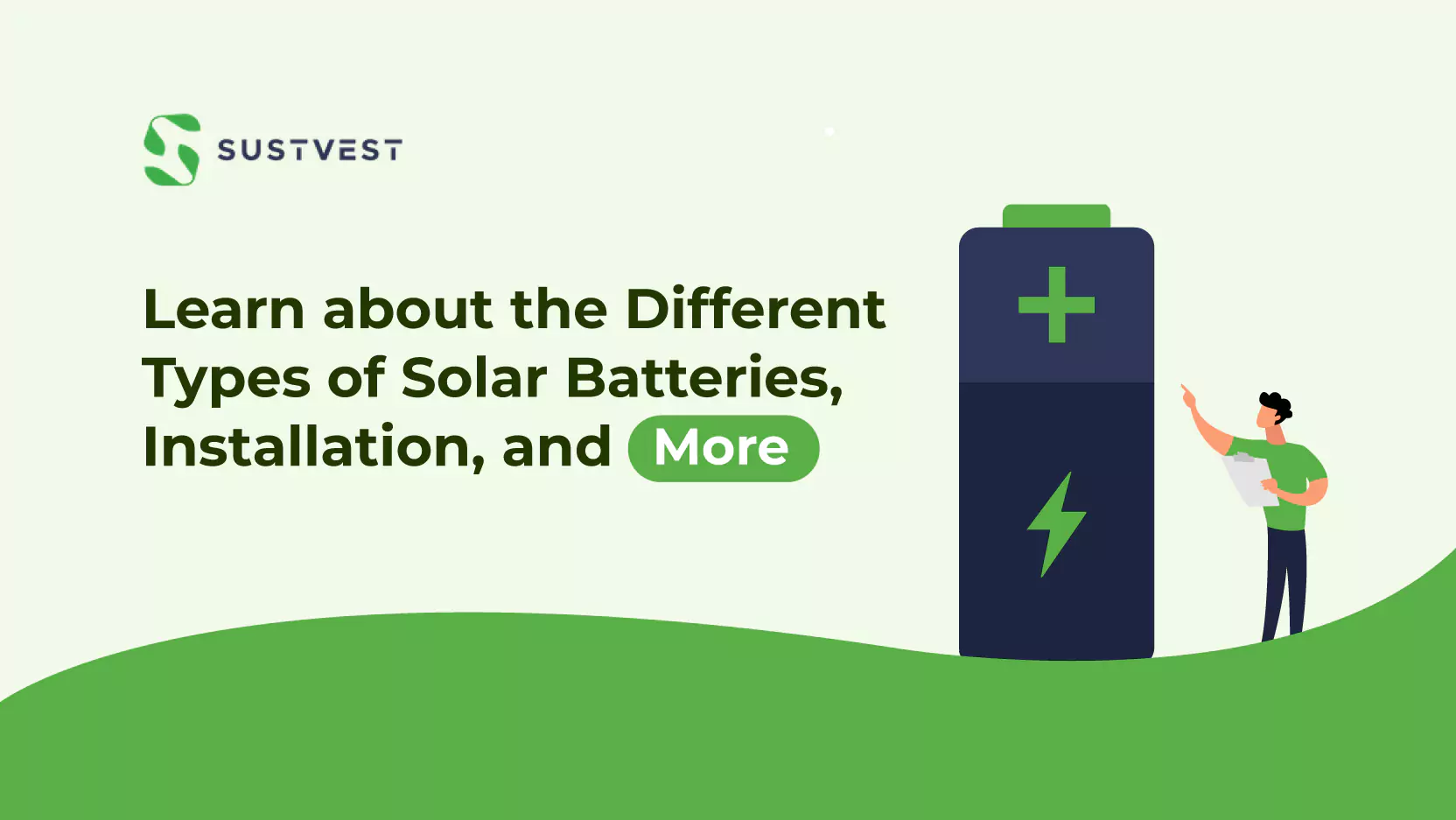Whoever invented batteries knew about the tremendous potential of these power boxes. You can’t imagine a world without batteries as they hold the key to powering all your electrical devices. Similarly, solar panel batteries play a critical role in charging the solar panel system. Whether you are searching for the best battery for your home solar system or are a complete beginner, you should understand the different types of solar batteries and their applications.
Let’s delve into the details of solar batteries in this blog.

Understanding the Importance of Solar Batteries
Solar batteries play a pivotal role in a solar power system, especially when it comes to maintaining a consistent power supply. These batteries enable homeowners and businesses to store excess electricity generated during the day for use at night or during cloudy days. The proper selection and installation of solar batteries are essential to make the most of your solar energy system.
Next, let’s uncover the types of solar batteries and check out their technology.
Types of Solar Batteries
1) Lead-acid batteries
Lead-acid batteries are one of the oldest types of solar batteries. They are known for their reliability and low cost, making them a common choice for off-grid solar systems. However, they have a limited lifespan and lower energy density compared to newer technologies.
2) Lithium-ion batteries
What is the best type of battery for solar storage? Lithium-ion batteries are a popular choice for both residential and commercial solar installations. They are highly efficient, have a longer lifespan, and offer a higher energy density compared to lead-acid batteries. These batteries come in various chemistries, including lithium iron phosphate (LiFePO4) and lithium nickel manganese cobalt oxide (NMC), each with its own advantages.
3) Flow Batteries
Flow batteries are relatively new to the solar energy scene but offer unique advantages. They are known for their scalability and long cycle life. Flow batteries store energy in liquid electrolytes, allowing for easy capacity expansion by simply increasing the size of the tanks. This flexibility makes them suitable for large-scale solar installations.
4) Nickel-Cadmium Batteries
While less common in solar power systems today, nickel-cadmium (NiCd) batteries are still used in some applications. They are known for their durability and ability to withstand extreme temperature conditions. However, their use has decreased due to environmental concerns regarding cadmium.
5) Saltwater Batteries
Saltwater batteries, or saltwater flow batteries, are an eco-friendly alternative to traditional energy storage solutions. They are non-toxic and have a long lifespan. Although they are still evolving, they show promise for future sustainable energy storage.
Now, let’s shed light on the installation process of solar batteries.
Installing Solar Batteries
The installation of solar batteries involves several steps, and it’s essential to follow best practices to ensure optimal performance and safety.
- Choose the Right Location: Place the batteries in a cool, dry, and well-ventilated area. Proper ventilation is crucial to prevent overheating and ensure the batteries operate efficiently.
- Secure the Batteries: Ensure the batteries are securely mounted and protected from physical damage or tampering.
- Connect the Batteries: How to connect solar panels to a battery? Connect the batteries to the inverter and solar panels. This is a critical step in integrating the solar batteries into your system. Proper wiring and connections are essential for efficient energy transfer.
- Monitor and Maintain: Regularly monitor the performance of your solar batteries and conduct maintenance as needed. This includes checking the electrolyte levels in lead-acid batteries, inspecting for leaks, and ensuring all connections are secure. How long to charge a solar battery? What is the frequency of charging? Maintain a proper sheet of all the data.
- Safety Measures: Solar batteries contain potentially hazardous materials. Ensure that the installation complies with safety regulations and that you have emergency procedures in place.
Next-Gen Innovations in Types of Solar Batteries
In recent years, there have been significant innovations in solar batteries, driven by the growing demand for renewable energy and the need for more efficient and sustainable energy storage solutions. These innovations aim to improve the performance, lifespan, and environmental impact of solar batteries. Let’s delve into some of the noteworthy advancements in solar battery technology:
I) Lithium-Ion Battery Advancements:
- Solid-State Lithium Batteries: Solid-state lithium-ion batteries have gained attention for their potential to provide higher energy density, longer lifespan, and improved safety. They replace the liquid electrolyte found in traditional lithium-ion batteries with a solid electrolyte, reducing the risk of leakage and overheating.
- Silicon Anodes: Incorporating silicon anodes into lithium-ion batteries has the potential to increase their energy storage capacity. Silicon can store more lithium ions than traditional graphite anodes, resulting in higher energy density.
- Fast-Charging: Innovations in lithium-ion technology have led to faster charging capabilities, making solar batteries more adaptable for quick energy storage and release.
II) Flow Battery Innovations:
- Advanced Electrolytes: Researchers are working on developing more efficient and cost-effective electrolytes for flow batteries. Organic and aqueous-based electrolytes are being explored to enhance energy storage capacity and overall system efficiency.
- Stacked Membrane Designs: Innovations in membrane materials and design have improved the performance and lifespan of flow batteries. Stacked membrane configurations help minimize energy loss and maintain system efficiency.
III) Hybrid Battery Systems:
Combining different types of batteries within a single system has gained popularity. For example, pairing lithium-ion batteries with flow batteries can provide both high energy density and scalable storage, optimizing the balance between power and capacity.
IV) Sustainable Materials:
Environmentally friendly materials are increasingly being used in battery production. This includes the use of non-toxic, sustainable components like water-based electrolytes and recyclable materials to reduce the environmental impact of battery production and disposal.
Now, let’s address some common questions about the different types of solar batteries to help you gain a more in-depth understanding of this technology.
FAQs – Types of Solar Batteries
Are Solar Batteries Worth It in 2023?
As of 2023, solar batteries continue to be a valuable addition to solar energy systems. Solar batteries enable you to store excess energy generated by your solar panels for use during the night or on cloudy days, providing a consistent and reliable power supply.
The financial benefits, including reduced energy bills and potential incentives, can make solar batteries a wise investment. It’s essential to evaluate your energy consumption and consider factors like battery lifespan, type, and installation costs to determine if solar batteries are worth it for your unique situation
What are the best solar batteries in the UK?
The best solar batteries in the UK may vary depending on your specific requirements, budget, and location. Some top-performing solar batteries in the UK include the Tesla Powerwall, LG Chem RESU, and Sonnen. These batteries are known for their reliability, efficiency, and compatibility with UK weather conditions. However, it’s crucial to check for the most recent reviews and industry updates to make an informed decision
What Are the Different Types of Solar Batteries?
There are several types of solar batteries available in the market. The most common types include lead-acid batteries, lithium-ion batteries, flow batteries, nickel-cadmium batteries, and saltwater batteries.
How Much Does a Solar Battery Cost?
The cost of a solar battery varies based on its type, capacity, brand, and location. On average, in 2023, a solar battery can range from a few thousand to several thousand pounds. Lithium-ion batteries tend to be on the higher end of the price spectrum due to their efficiency and longer lifespan.
When considering the cost, it’s important to factor in not only the initial purchase price but also installation, maintenance, and potential long-term energy savings.
Are solar batteries the same as rechargeable batteries?
Solar batteries are a type of rechargeable battery designed specifically for solar power systems. While both solar batteries and typical rechargeable batteries store energy for later use, they differ in terms of size, capacity, and purpose.
Solar batteries are designed to store larger amounts of energy generated by solar panels, making them suitable for powering homes and businesses. In contrast, typical rechargeable batteries are smaller and used for portable devices like smartphones or laptops.
Can solar batteries be recharged?
Yes, solar batteries can be recharged. They are designed to store excess electricity generated by solar panels during the day. This stored energy can be discharged when needed, and the battery will recharge during periods of ample sunlight.
The recharging process occurs automatically and is a fundamental aspect of how solar batteries operate. Proper maintenance and monitoring of your solar battery system will ensure efficient recharging and optimal performance.
What are the environmental impacts of different types of solar batteries?
Lead-acid batteries have environmental concerns due to lead and sulfuric acid content. Lithium-ion batteries can also have environmental impacts in terms of mining and disposal. Sustainable options like saltwater batteries are gaining popularity for their eco-friendly characteristics.
Conclusion
Types of solar batteries are an integral part of harnessing solar energy efficiently. Choosing the right battery type and installing it correctly is key to reaping the full benefits of your solar power system. Do you want detailed insights into the solar industry of India, get in touch with Sustvest to stay ahead of your competitors today.
Also read: 10 Causes of Solar Panel Damage and How to Avoid Them.

Founder of Sustvest
Hardik completed his B.Tech from BITS Pilani. Keeping the current global scenario, the growth of renewable energy in mind, and people looking for investment opportunities in mind he founded SustVest ( formerly, Solar Grid X ) in 2018. This venture led him to achieve the ‘Emerging Fintech Talent of the Year in MENA region ‘ in October 2019.




